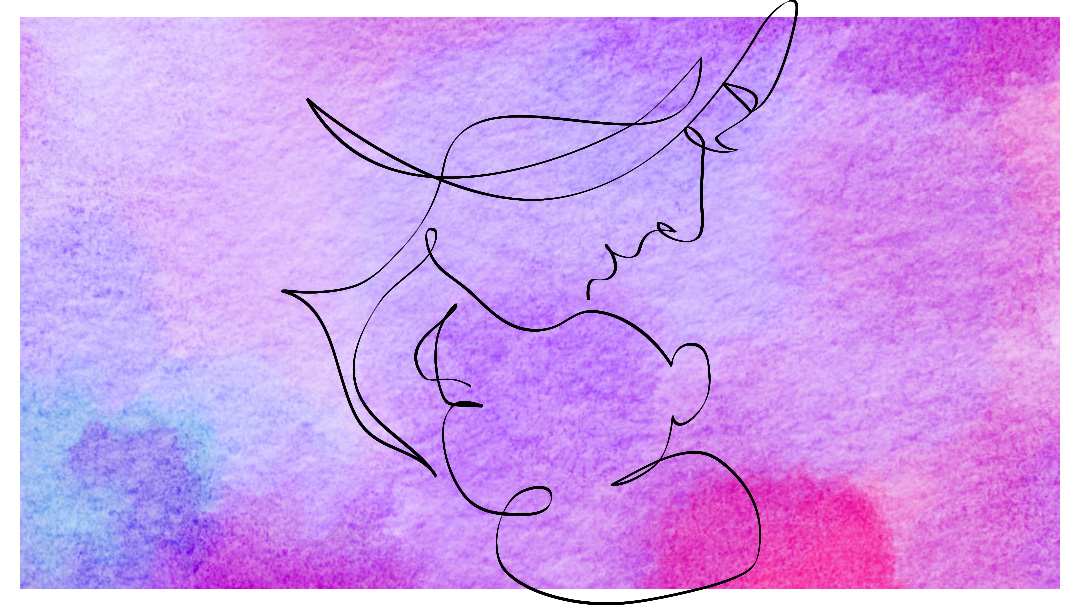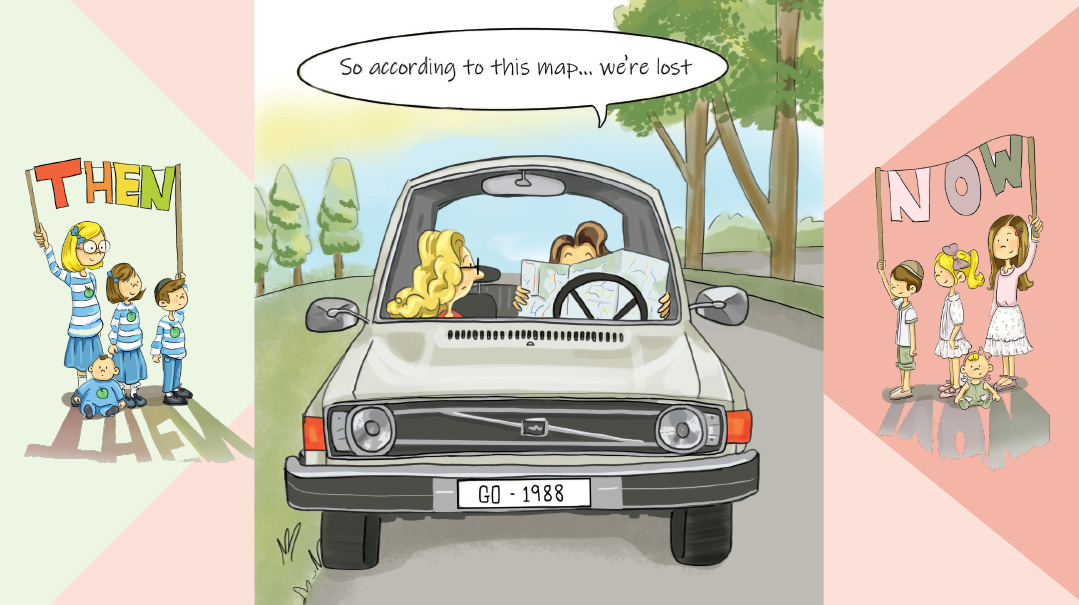Mazel Tov! It’s a Mommy!
| March 15, 2022While creating a birth plan is important, less typical but just as crucial, is creating a postpartum plan

Mothers need the same thing a newborn baby does. They need to be swaddled with support. They need to be affirmed and held.” These lines are a mantra in the professional birth community of doulas and OBGYNs. A postpartum plan can help that happen. It’s a mapped-out set of preferences and needs, a plan of action for what happens in the initial days and weeks after birth, during which a mother adjusts to life with her little miracle.
Modern society has forgotten that a woman who’s postpartum is just as vulnerable after the baby is born as she is during labor. Often exhausted from the birth, instead of resting, she’s tasked with caring for a newborn who needs her for absolutely everything.
Creating a postpartum plan enables a mother to think through in advance what will help her, bring her comfort, and calm her. It allows her to plan how to get the support she’ll need so she can feel as good as possible afterward.
When creating a postpartum plan, the first starting point is to have a plan of action for the technicalities. Who’s going to take responsibility for her family’s physical needs while she recuperates? Who will pick up the other children from school those first few days (or weeks)? What will we do for suppers in that initial period?
Other technical but emotionally charged questions might be: Do I want visitors in the hospital? Who am I comfortable with holding my baby? Do I have a pediatrician to go to?
An Ounce of Prevention
Mrs. Chaya Rochel Satt MSc, who’s maintained a private practice in Yerushalayim for over a decade, believes that the physical preparation we do pre-birth prepares us emotionally as well. “Educating ourselves about childbirth reduces fear and panic during childbirth. So, too, does educating ourselves about the postpartum period. During this time, our hormones come crashing down, which affects our mood. That’s normal, healthy, and supposed to happen. Understanding that is critical.
“Crying a few days after birth is normal, feeling exhausted and wanting to stay in bed is normal. Often the anxiety and depression that many women experience is an emotional response to healthy emotional distress. Knowing that emotional distress is normal and embracing it is very important. You’d ask for a Tylenol after birth if you were in pain. When you feel overwhelmed, ask a friend for a hug, or ask your husband to take care of the baby so you can decompress. Taking care of your emotional needs prevents them from escalating.”
Mrs. Satt is clear to differentiate between a normal, healthy, but hard emotional state after birth and one that requires professional help. “Anything extreme isn’t good,” she says. “Being weepy or easily irritated is normal, but incessant crying, inability to function, and loss of appetite requires swift professional intervention. Any thoughts of harming yourself or others require immediate, and I mean immediate, professional help. Also, the length of time that a woman experiences these emotions matters.”
Rav Ami Merzel, rosh kollel of the American Kollel at Yeshivat Netiv Aryeh and talmid of Rav Nebenzahl shlita, periodically give a shiur to his avreichim about the halachos of birth, followed by a schmooze on the postpartum period. “It’s important for both mothers and fathers to know that it’s normal for a woman to be very emotional and overwhelmed. If the intensity of those emotions increases or goes on for weeks with no improvement, it’s imperative to seek help. V’nishmartem me’od l’nafshoseichem.
“Husbands need to have their antennas up because postpartum depression or anxiety happens in the frum world just like everywhere else. If a couple isn’t sure if the situation is normal or a postpartum mood disorder, they should consult with a doctor or therapist. Not a chavrusa or shoel u’meishiv, but a professional. Hashem wants healthy and happy Jewish families.”
Chesed Everywhere
As frum women, a big shift for mothers in the postpartum period is the total reformation of her spiritual avodah. Recognizing this beforehand is also an important factor in postpartum planning. Rebbetzin Yehudis Golshevsky, Director of Shiviti, a women’s learning program, often finds herself advising and counseling talmidos who struggle with their newfound “inability” to continue to do chesed or connect in a ruchniyus way.
This is especially true for those who already have a few small children at home. Rebbetzin Golshevsky explains that it’s a “spiritual discipline” to let go of perfectionism and comparisons with others, to learn to be happy with doing your best, and be willing to ask for and receive help as needed.
Women who are accustomed to long tefillos and attending shiurim can feel a lack of ruchniyus when in the postpartum period, because it tends to be a highly restrictive and demanding time. Rebbetzin Golshevsky believes that this stems from a mistake in our perspective. “We have very incorrect ideas about what avodas Hashem is in general, and specifically for women. If you’re a mother, it’s important to know that all the learning and davening you did before motherhood was supposed to equip you with sufficient resources to carry out the tafkid of your life, of being an eim b’Yisrael.
“You should be able to connect to HaKadosh Baruch Hu, not just in shul, but at three a.m. rocking a baby back to sleep for the third time that night. That is your place of avodah and chesed. Some of my most intense tefillos were said in the middle of the night with a baby.
“Motherhood is a shift of spiritual gears. It’s chesed, chesed, chesed all the time, and this is the emulation of all the Divine middos of loving kindness and compassion. To feed a baby is chesed. To change a baby is chesed.
“There’s nothing higher than being maavir al hamiddos. What’s the devotion to the needs of small children other than maavir on the middos of self-involvement and impatience? And what’s greater than being the vehicle to express the Divine middos of mercy and compassion? If you’re having trouble making that transition, then you might need some eitzah and chizuk from someone who has already walked this path.”
Ride with It
Women find it surprising or even challenging to hold space for so many seemingly conflicting emotions. They feel joy and gratitude over their new baby, but also exhaustion and frustration over feeding issues. They take pleasure in caring for their newborn and introducing their loved ones to the newest member of the family, while also stressing the details of how to do it and manage everyone’s schedules.
Mrs. Satt says that when treating women who suffer from postpartum depression, they often articulate that they tried to shut their negative emotions down because they just wanted to feel happiness over their new addition.
“Often, a laboring woman will want to shut down the contraction. Her doula or midwife will explain you can’t shut it down; you have to ride it. This approach also needs to be carried over to healthy postpartum expectations. You’re on a rollercoaster of emotions, and there’s no getting off. So strap yourself in, dressed in the armor of emotional and practical support, next to your educated and loving partner, and ride it together.”
Mrs. Satt also believes there are plenty of practical things to do that really make a difference to a woman’s emotional state after birth. “Some suggestions I make to my clients who are postpartum, whether they’re in my office because of a postpartum mood disorder or not, are that they should eat nutritionally dense, balanced meals, especially for breakfast, because it helps regulate hormones. Get sunlight and some doctor-approved physical exercise. A 20-minute walk in the sun, even though it may be hard to push yourself to do it, can work wonders.”
Make It Work
To create a postpartum plan, you need to honestly examine your emotional needs. This is often easier for experienced mothers because they can look back on previous births and examine what was really challenging for them and what helped them through.
Ask yourself:
- Which of my needs are the most important? Sleep? Nutritious food? A tidy house? Whatever it is, that’s where you should invest your time, energy, and resources.
- What soothes me, comforts me, and brings me joy? The answer to this question will be different for every woman. Some women may desperately crave alone time with their baby so they can peacefully bond, while others might thrive off of interacting with close friends and family members. While it’s specific to the individual, the process of honing in on the most pressing needs and planning structure is the same.
Keeping that in mind, fill out your postpartum plan:
Sample Postpartum Planning Template
Visitors:
We expect to have _____ visitors the first three days.
We expect to have _____ visitors the first two weeks.
Code word or code phrase for partner to help encourage guests to leave is _____.
Parenting / Family Responsibilities:
Who will be doing the following? (It may be one of you, both of you, or someone you hire.) Changing diapers ____ Feeding the baby ____ Calming the baby ____ Burping the baby ____ Bathing the baby ____ Going on walks with the baby ____ Meal prep or takeout ____ Laundry ____ Housecleaning ____ Caring for the older children and their schedules ____Bills and finances ____ Grocery shopping ____
Who can help?
- The morning time:
Name: _____________________________ Contact Info: _____________________________
- The afternoons / evenings:
Name: _____________________________ Contact Info: _____________________________
Food:
Freezer meals to make: ___________________________
Grocery stores that deliver or have curbside pickup: ____________________
Restaurants that offer delivery and takeout: _____________________________
Sibling Support:
Who can help watch over and care for your older children when mom and baby return home? Name: _____________________________ Contact Info: _____________________________ Name: _____________________________ Contact Info: _____________________________ Name: _____________________________ Contact Info: _____________________________
Mommy Time
What calms you? ____________________________
What brings you joy? _________________________
What makes you laugh? _______________________
What reenergizes and recharges you? ____________
Mommy and Daddy Time
What activities do you both enjoy doing together that will help you reconnect as a couple?
- _______________________________________
It’s important in our relationship that we:
- _______________________________________
What Works for Me
Seven mothers share what they need during the postpartum period:
Esther: I have an intense need to be taken care of and pampered. Maybe it has to do with the fact that I’m taking care of someone 24-7, maybe not. Nothing makes me feel cared for more than a clean house and small but significant luxury gifts. My husband is happy to help me in any way, but what can I say? Washing floors isn’t his forte. We sit down when I’m in the beginning of my ninth month, and I give him all the contacts I have for cleaning help. In the weeks after birth, he arranges extra cleaning help for me and puts reminders in his phone to randomly buy me chocolates and nice-smelling lotions. It may sound insignificant, but it makes me feel special.
Tziporah: I know it will take me at least a year to fit into my old clothes. With each child, my size changes a bit, so some things just need to be given away. Every time it gets me down. I want to feel good about how I look, and being in a nursing robe all day for days on end gets to me. What I’ve learned to do is to go shopping when I’m five months pregnant for something for after the birth. I get myself a Shabbos top, a weekday top, and maybe a new tichel or pair of shoes. This way I have something new and fresh to wear after birth, and it helps me feel put together.
Chani: Everyone talks about stocking your freezer before birth, and I did that for child number one up until child number seven. After that it got a bit difficult with freezer space. I’ve learned that my plan needs to be adjusted according to my family size and dynamics. Yes, stocking my freezer with ready-made suppers when I had a 5-year-old and 3-year-old at home was great, but I have teenagers now. So instead of spending countless hours in my ninth month on my feet cooking, I go out and buy small gifts for the teenage daughters who will be throwing together simple suppers for the rest of the family while I’m still recuperating.
Miriam: Mothers of multiple small children, take heed. In your third trimester, go out and buy some good toys or games and put them in a box. It should be things your children can play without your help. Congratulations, you’ve just created the nursing box. This box gets taken out only when Mommy nurses. If you have babies that are anything like mine (marathon nurses), this will be a life saver.
Shani: I was so overwhelmed trying to figure things out after my first child was born, I decided I never wanted to be so unprepared. You might have no feeding issues for your first few children, but guess what? It’s not a guarantee all of your children will be like that. In the months before each birth, I make a laminated list that I stick on my fridge of resources that include a lactation consultant, a sleep consultant, pelvic floor therapist, and the like. This saves me time and emotional energy in finding the resources I need when I need them most.
Adina: After our first two children, we learned that there’s a spectrum of how a person functions without sleep. Some really can handle it better, and some, like myself, really can’t handle it much at all. I feel incredibly emotionally raw without sleep. I used to feel guilty about this, but I no longer do. It’s part of the way Hashem made me, and my job is to work with it. So by the time our third child was born, we decided we’d rather make modest simchahs, get second-hand baby equipment, and be extra frugal during pregnancy, and set money aside for a night nurse. My other children have a functional mother, and overall, I feel like a mensch. I like nice and new things just like the next person, but I can’t appreciate them if I don’t sleep. Sleep is the priority.
Elana: This may sound silly, but in the weeks leading up to birth, I tell myself over and over again: “I’m not a ball. I’m not supposed to bounce back.” With my first few children, I got so caught up in comparing myself to other women. I saw them, and they looked so much more functional than I felt. It took real inner work to stop looking outward and affirm myself inward. I’m doing my best, and my best is good enough.
(Originally featured in Family First, Issue 785)
Oops! We could not locate your form.






